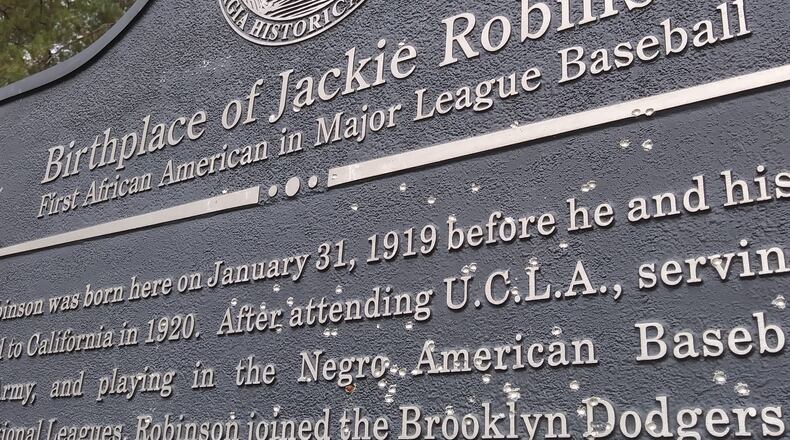After vandals severely damaged historical markers recognizing MLB legend Jackie Robinson and Valdosta lynching victim Mary Turner, the Georgia Historical Society will erect replacement markers this week and in late January.
The new sign memorializing Turner, whose brutal mob lynching while she was pregnant made international headlines in 1918, will be dedicated in a private ceremony on Dec. 10, about 5 miles from the site where she was murdered in Lowndes County near Valdosta. The new sign honoring Robinson will be dedicated in late January in Grady County at the site of his birthplace along Hadley Ferry Road. A duplicate of that marker will be dedicated about 14 miles away in downtown Cairo, the county seat, on Jan. 28.
Credit: Library of Congress
Credit: Library of Congress
In February, vandals blasted the aluminum sign honoring Robinson, the baseball pioneer who integrated Major League Baseball in 1947, with what may have been a shotgun, leaving it pocked with holes too deep to repair. The Lowndes County Sheriff’s office never got leads in the case and no arrests were made.
The incident was significant in that of the more than 300 historical markers sponsored by the Georgia Historical Society since 1998, only those relating to Black history have been damaged by gunfire, Todd Groce, president and CEO of the historical society said at the time. The Robinson sign is part of the Georgia Historical Society’s Civil Rights Trail series: 44 markers recognizing significant people, events and places that shaped the state.
Seven months after the vandalism, the MLB announced it would pay for the replacement of the sign and donate $40,000 for its perpetual upkeep by the historical society. The historical society is paying for the duplicate marker in downtown Cairo with money from its marker program, said Elyse Butler, manager of the program. The society is not a state agency, though it does have an agreement with the state to care for markers erected by the state prior to the late 1990s, when the society took over the program.
The Jan. 28 dedication will be open to the public.
The marker remembering Turner and the week-long lynching rampage that swept through Lowndes County in 1918, will be dedicated in a more private ceremony, Butler said, because of COVID-19 protocols.
The marker tells the story of how Turner, a pregnant Black woman, and a dozen other Black people were brutally murdered in a killing spree by white vigilantes near Valdosta. The murders sparked an exodus of Black people out of the South Georgia town but also inspired federal anti-lynching legislation, which, though drafted, was never passed by Congress.
Turner was 33 years old when her husband was wrongly accused of murdering a white farmer and shooting his wife, who survived. A mob formed and lynched Turner’s husband and at least a dozen other Black people over the course of a week. Mary Turner was forced to a remote spot along the Lowndes County shore of the Little River. She was hung upside down from a tree, set on fire, her womb sliced open, her baby’s skull crushed by the boot heel of one of the lynchers. Then her remains were struck by volleys of gunfire. No one was ever arrested or charged in her killing or any of the others.
The original Turner marker was erected at her murder site, but over the years was the repeated target of vandals. It was removed in late 2020 and an informal steel cross bearing her name was placed in its stead by concerned community members.
Credit: The Mary Turner Project
Credit: The Mary Turner Project
The new, official remembrance marker will go up outside Webb Miller Community Church in Hahira. Some of Turner’s descendants and other community members who hold an annual vigil to honor her and the other victims are expected to attend. Board members of the society are paying for the new sign.
About the Author
Keep Reading
The Latest
Featured






